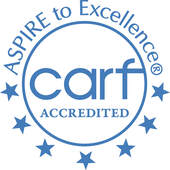|
Methadone replacement therapy works because it fulfills three basic requirements of any program of recovery from drug and alcohol addiction. The program, to be effective, must
(1) reduce access to drugs and alcohol. It must provide a (2) supportive structure as well as make the client (3) accountable to dependable persons other then themselves. The first requirement is that access to drugs (in this case opiates) is limited. A methadone maintained client loses his craving for opiates because the methadone sticks to the opiate receptors in the brain and won’t let any other opiates get by them. While the methadone is playing spoiler, it activates the receptors thus reducing the desire for opiates (sort of like when you don’t want to eat because you are full) at the same time that it prevents the sickness of opiate withdrawal from occurring. This process occurs slowly so that the intoxicating effects on the nervous system are minimized. In this way, the first requirement of a program of recovery is fulfilled as far as opiates are concerned. Other drugs and alcohol continue to have to be avoided to prevent active addiction on top of methadone maintenance. The primary goal for all other drugs of abuse and alcohol, while in methadone maintenance, is complete abstinence. As a client is stabilized on methadone, opiate intoxication no longer occurs. This leaves the client, who greatly misses the intoxication effect, vulnerable to the abuse of other drugs and alcohol to replace the loss of his usual opiate high. The second requirement of a program of recovery is supportive structure. An addict whose life has been dominated by chasing drugs needs to replace the old order of things with a new order of things. In a methadone maintenance program, structure is maintained by the need to acquire the methadone as well as a schedule of mandatory therapeutic services. In the early stages of recovery, the structure is implemented by requiring that a client attend the clinic daily to pick up the medicine. The intensity and frequency of therapeutic services is high for the first 90 days to a year. Participants may be required to attend groups and individual sessions weekly, but as the client is in the program longer services may become less frequent. At first, the methadone clinic may be the sole source of structure for the client, but as time passes other sources begin to emerge such as deeper involvement in the 12 step program, work, healthy exercise and family involvement. As normal life structure begins to develop the methadone clinic reduces its role in the client’s life. The ultimate goal of a therapist is to do away with the therapist. The third requirement of a program of recovery is accountability. A new client needs to find ways to make her self accountable to dependable outside authorities. The nature of recovery from addiction is to realize that when an addict is left to his own devices he will not be able to keep himself straight. He needs guard rails. The methadone clinic provides these guard rails by providing a regular monitoring service. Clients are tested for drugs and alcohol so that when the clinic staff and the client say that the client is free of illicit drugs, the evidence is objective. The client is also required to bring in any prescriptions for evaluation in order to prevent the client from abusing licit drugs. It is much harder to use or abuse drugs or alcohol when you are in a relationship with an objective and observant person and that person has the ability to manage positive and negative rewards to keep you on track. For any program of recovery to be successful these three aspects of a TX program, limiting access, providing structure and accountability must be implemented along with encouragement to find a more effective philosophy of life. -Sacred Heart Therapist
0 Comments
Your comment will be posted after it is approved.
Leave a Reply. |
Submissions from the Heart
POEMS, ESSAYS, ART & STORIES FROM SACRED HEART CLIENTS, FAMILY, STAFF & THE RECOVERY COMMUNITY. Archives
December 2019
Categories
All
|
- PROGRAMS
-
ABOUT
-
RESOURCES
- PUBLICATIONS >
- VIDEO TOURS
- FAQ'S >
- MERCH SHOP
- COMMUNITY RESOURCES
- Grievance Form
- UFAM RESOURCES
- NEWS & EVENTS
- About CEHR Client Portal
- About Zoom Virtual Services & Download
- About Engage App & Download
- Medications for Substance Use Disorders
- MDHHS Communicable Disease Links
- SUD Health Home
- FASD Clinic Referral Resources
- Nami Resource Guide for Families Dealing with Mental Illiness
- Michigan Smokers Quit Kit
- Funding-Regional Prepaid Inpatient Health Plans
- CAREERS
- CONTACT
- CEHR
- GIVING
If you think you have a medical emergency, call your doctor or 911 immediately. Do not rely on any electronic communications or communication through this website and/or apps (such as; email, chat, VM, or text messaging/appointment reminders) for immediate, urgent medical needs.
This website and/or apps are not designed to facilitate medical emergencies.
This website and/or apps are not designed to facilitate medical emergencies.
 RSS Feed
RSS Feed

